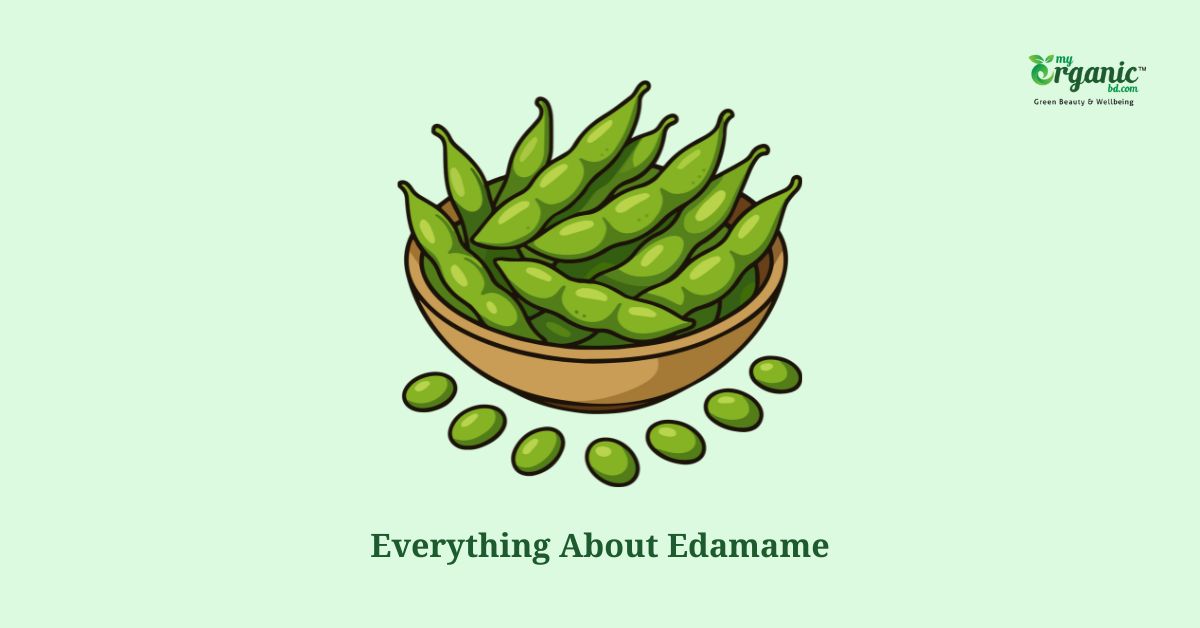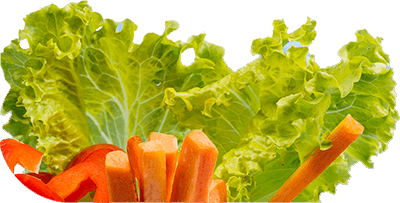Edamame aka young soybean is one of the trendiest snacks in Japan. It is getting popular worldwide for great taste and health benefits. This is actually unripe green soya beans. The steam is boiled with a slight salt to prepare this healthy snack.
Edamame is filled with protein, fiber, minerals, and many other nutrients. It’s nutrients dense in healthy food. Also very easy to cook. It contains a lot of potential for heart health, blood sugar regulation, hormone balance, and many more.
Hi, we are Team My Organic BD. We are a team of nutritionists, doctors, microbiologists, and writers. Working together to create some of the most insightful articles about organic food and lifestyle. With our 70+ years of cumulative experience in wellness industry, we easily satisfy your knowledge thirst.
In this article, we will dive deep into the nutritional properties and health benefits of edamame. We will also go through the history, uses, facts, and cover almost all the questions people ask. This is going to be a fun, informative journey with all the essential facts about edamame.
Let’s start.
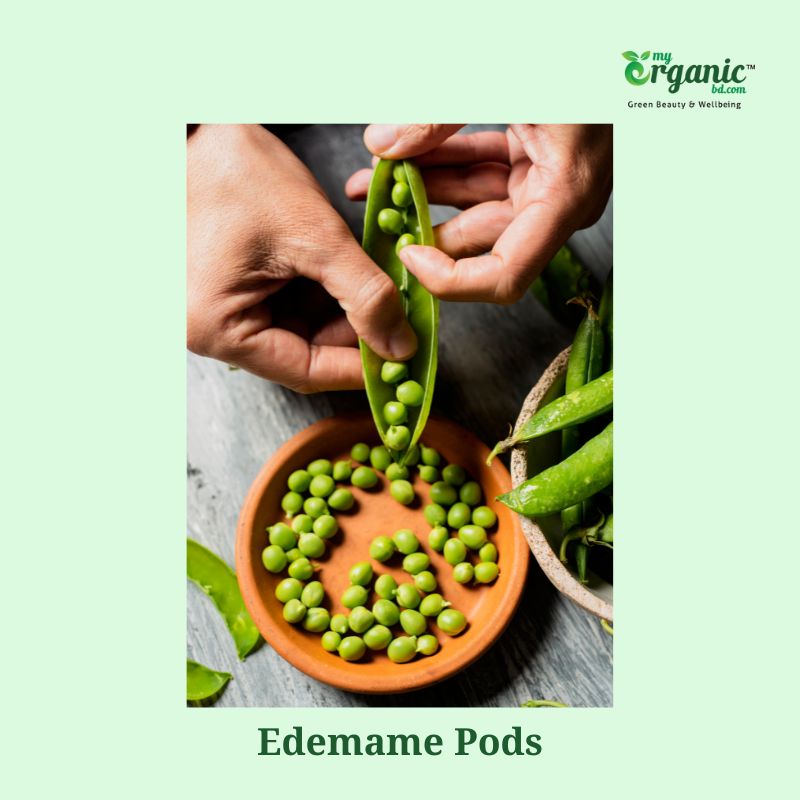
Is Edamame a Superfood?
People all over the internet are interested in knowing if edamame is a superfood or not. We can understand people’s tendency to find a magical health-boosting food. But actually, there is no single food that has everything for good health. Good health requires variety in the healthy diet. However, some foods naturally have more benefits than others. As there are no universal criteria for a superfood, we followed a logical system to determine if a food is a superfood or not. See the fundamentals of Superfoods: Benefits, Types, List & Uses for Natural Wellness.
According to our criteria for superfoods, edamame easily goes superfood category. How? Here is why – According to the criteria, a food must have one of three characteristics for good health. It can have a variety of nutrients, or rare nutrients in abundance, or have special health-boosting ability. If we examine edamame closely, it easily falls into the first category of superfoods. It contains numerous nutrients that can play a crucial role in wellness. We will discuss more in the further sections.
What are the history of Edamame?
The history of edamame takes us back 7000 years. It was originated in China. The first documented trace is found in 1275 in Japan. In 1406, people ate soybean leaves during the famine. They used almost every part of the soybean plant. In Japanese haikai verse, this appeared multiple times between 1603 to 1868.
The first mention of edamame was found in 1855; the text describes an edamame farmer who had difficulties farming soybeans. Around the early twenty-first century, young soybeans was becoming popular as a snack. Supermarkets and other shops started selling this at that time. Japanese Americans also started growing edamame in American soil. Today, young soybeans are considered one of the healthiest snacks, loved for its taste and wellness benefits.
What are the Nutritional Facts of young soybeans?
Here is what you can get in one cup of edamame—
Macronutrients
- Calories: 224
- Protein: 37% of the Daily Value (DV)
- Total Fat: 12.1g
- Carbohydrates: 13.8g
- Fiber: 8g
- Sugars: 3.38g
- Water Content: 113g
Minerals
- Calcium: 10% of the DV
- Iron: 20% of the DV
- Magnesium: 25% of the DV
- Phosphorus: 37% of the DV
- Potassium: 20% of the DV
- Copper: 59% of the DV
Vitamins
- Folate: 115% of the DV
- Vitamin K1: 38% (women’s DV) / 50% (men’s DV)
- Thiamine (Vitamin B1): 25% (women’s DV) / 50% (men’s DV)
- Riboflavin (Vitamin B2): 19% (women’s DV) / 22% (men’s DV)
Brief explanation of nutrition profile
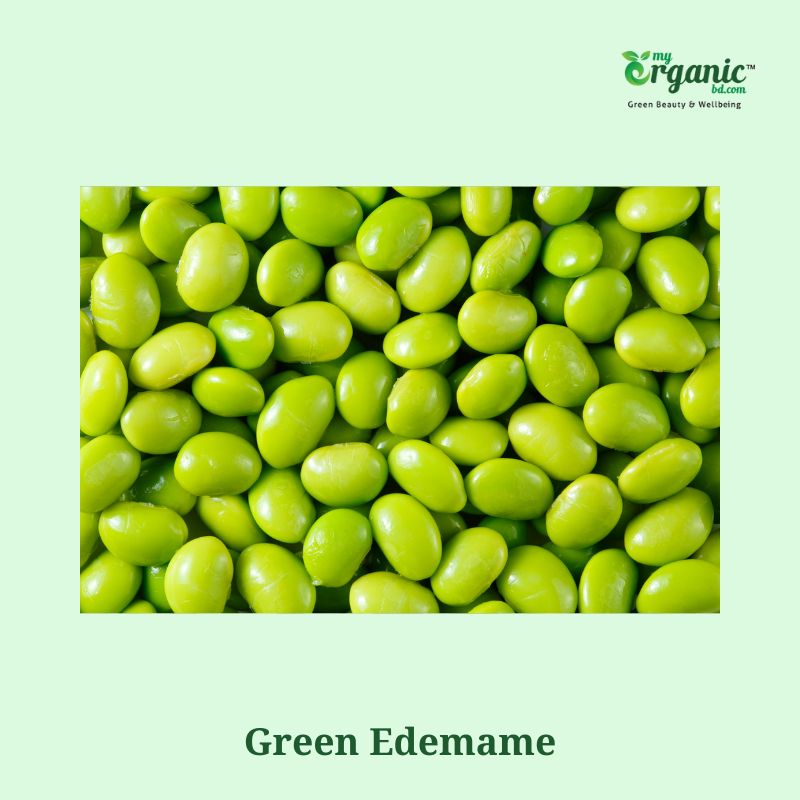
Let’s break them down from the perspective of good health.
Calories: It comes with a good amount of calories. Also contain fiber, protein, complex carbohydrates, and many other nutrients for optimum health. The energy from edamame comes slowly, which makes it perfect for workouts and people at risk of diabetes.
Protein: This is an excellent source of plant-based protein. Most of the plant-based protein food lacks some of the amino acids that are required for good health. But young soybean is different as it contains all 9 essential amino acids. In just one cup of edamame, you can get about 37% of your daily protein required. Protein plays a role in muscle development, body repair, the production of enzymes, and immune function.
Fat: One cup of this immature soybeans contain about 12.1 grams of healthy fat. Those fats are unsaturated and do not cause any harm to the body. Most of the snacks we consume contains trans and unhealthy fat. But this green vegetable comes with omega-3 and omega-6 fatty acids. Those fats can help reduce inflammation, minimize cholesterol levels, and improve cardiovascular health. Fat is also required for the absorption of fat-soluble vitamins.
Carbohydrate: One cup of young soybeans contains about 13.8 grams of carbohydrate. Interestingly, it has a pretty low GI of 15. Which means the carbs of this veggie burn slowly and does not cause sugar spikes. This can reduce the chance of chronic diseases like type 2 diabetes. A consistent release of energy will improve your physical and mental performance.
Fiber: Good fiber is one of the common traits of most healthy foods. One cup of this green vegetable contains about 8 grams of soluble and insoluble fiber. Those fibers can play an essential role in the reduction of blood sugar, cholesterol levels, and risk of chronic disease of the digestive system. Insoluble fiber also adds weight to the stool and feed for the beneficial gut bacteria.
Sugar: This veggie contains a small amount of sugar. But you don’t need to worry about it. It’s a complex sugar, and combining with it’s insulin-regulating powers, not effect your body.
Calcium: Young soybeans contains a decent amount of calcium. Calcium has a crucial role in maintaining bone and teeth health. It also supports muscle function, nerve connection, and the blood clotting mechanism.
Iron: One cup of edamame contains about 20% of the daily requirement of Iron. Iron is essential for blood cell production, oxygen transport, energy production, and other metabolic functions. It also contains vitamin C, which improves the absorption of vitamin C.
Magnesium: The green vegetables has a good amount of magnesium. It has a role in muscle relaxation, nerve function, and the stress reduction mechanism. Magnesium also supports energy metabolism and digestive efficiency.
Phosphorus: One cup of edamame contains about 37% of the daily requirement of phosphorus. It is vital for building cell membranes, energy metabolism, and the formation of teeth and bones. It also has a crucial role in DNA and ATP synthesis.
Potassium: This nutrient is vital for maintaining fluid balance, regulating blood pressure, and heart health. It can benefit people who are involved with athletic activities, preventing muscle cramps and fluid balance during workouts.
Copper: The young soybeans are rich in copper. It is a trace mineral essential for the immune system, blood cell formation, and collagen production. One cup of this veggie contains about 59% of the daily requirement of copper.
Folate: Folate (B9) is a vitamin that has a role in red blood cell formation, DNA synthesis, and cellular function. One cup immature green soybeans provide about 115% of the daily required folate. For pregnant women, folate is a crucial nutrient, and most mothers in the world lack this nutrient during their pregnancy. It is essential for the development of the fetus. It also reduces the risk of neural tube defects. It supports brain function and reduces the risk of neurodegenerative disease. Folate can also help improve mood as it supports the production of neurotransmitters.
Vitamin K: Edamame contains a significant amount of vitamin K, which is responsible for preventing bleeding and blood clotting. It also works with calcium and helps to make bones stronger.
Thiamin: Also called Vitamin B1, essential for energy metabolism, heart health, and nerve function. One cup of edamame contains 25% and 50% of the daily requirement of B1 for men and women.
Riboflavin: Also known as vitamin B2, is important for cellular repair and energy production. It is also a powerful antioxidant. It helps in the digestion of protein, fat, and carbohydrate. It is also a powerful antioxidant. One cup of edamame contains about 19-22% of the daily required value.
Now you can see, this super veggie contains quite a lot of important nutrients for wellness.
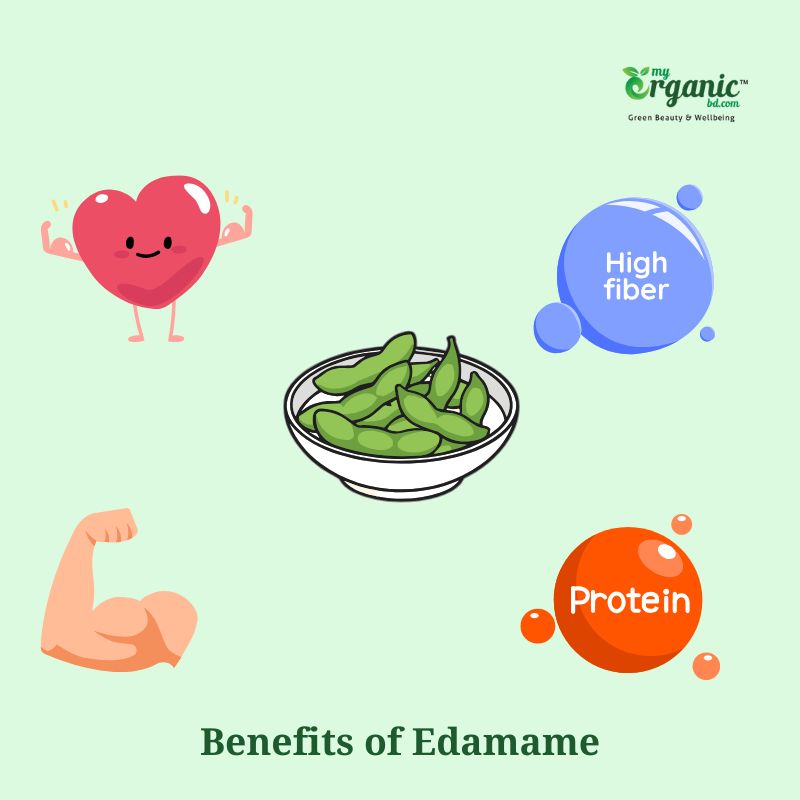
What are the benefits of Young Soybeans?
We already discussed nutrient-specific benefits of this superfood. In this part, let’s discuss about science backed health benefits of this super vegetables in details:
Heart health
Edamame contains several beneficial effects for heart health. One 2021 study concludes that 25 grams of protein from soya can reduce blood cholesterol by 3%-4%. Cholesterol-reducing effect can minimize the risk of chronic heart disease. It also contains antioxidants like isoflavones that protect the arteries of the heart from oxidative damage. It also has magnesium and potassium, which improve blood sugar function. It contains high unsaturated fat such as omega-3 and alpha-linolenic acid. Those components have beneficial effects on vascular health. Edamame can also reduce inflammation, which is directly linked to heart disease. It also contains fiber that improves cholesterol function in the body.
Digestion
This green vegetable is rich in fiber that can regulate your bowel movement and prevent constipation-related problems. The fibers are excellent prebiotics for the gut bacteria. Prebiotics are foods that improve the growth and diversity of gut flora. Oligosaccharides in edamame also work as a prebiotic. Fiber slows down the digestion process, which enables more time to absorb nutrients in the body.
Reproduction
This super green contains folate, which is essential for DNA synthesis and fetus development. A lack of folate can cause birth defects in babies. Isoflavones from edamame can also help hormonal balance in women. It also contains a good amount of iron and protein, which are vital during the pregnancy period. Zinc from edamame also contributes to men’s sperm count and movement. It is rich in vitamin E, which is an excellent antioxidant for the reproductive organs.
Weight Loss
This veggie contains high protein that reduces appetite. With its high nutrient density, it is also low in calories, enabling healthy weight loss. Fiber keeps you full for longer and reduces food cravings. Its blood sugar-regulating effect also minimizes food craving. Replacing it with processed snacks can contribute to weight loss and good nutrients.
Brain health
It contains choline, which supports neurotransmitters in our brain. Isoflavones also contribute to better focus and memory. Its powerful antioxidants can protect brain cells from oxidative damage. Edamame is rich in iron, which supports oxygen transport in the brain. Omega-3 fatty acids are also essential for brain cell membrane function. It also contains magnesium, which promotes calmness, mood, and better sleep.
Immunity
This veggie is rich in iron, zinc, and copper, which are essential for immune cell function. Isoflavones work both as an antioxidant and an antimicrobial in our body. It is also rich in fiber, which improves gut health, which is vital for optimum immune function. All the immune cells are made of protein. This green vegetable provides the necessary protein components for the production of immune cells. Vitamin C from this veggie reduces oxidative stress and supports white blood cell function.
Blood Sugar
It has a low glycemic index, which helps to balance glucose levels in the blood. Fiber slows down the absorption of carbohydrates. Isoflavones also have a reducing effect of isoflavones. Its high protein content does not cause post-meal sugar spikes. Magnesium also supports glucose metabolism in our body. Consuming edamame reduces the chance of developing type 2 diabetes. Diabetic patients can have this super veggie as a healthy snack.
Disadvantages of Edamame
Generally this super vegetable is safe. Some cases, it may cause digestive discomfort or bloating. Some people may also be allergic to vegetables. It contains isoflavones, which may interact with thyroid function. This can be more risky for people who have an iodine deficiency. Raw edamame contains trypsin, which can interrupt nutrient absorption. High Processed young soybean products often contain sodium and other additives, which may have adverse health effects.
What are the uses of young soybeans?
Edamame is not just a snack that you can eat instead of chips and cookies. You can take it many ways like :
- Salad
- Smoothies and soups
- Stair fries
- Plant-based protein source
- With grain bowls
- Curry
- Healthy sandwiches. etc.
There are a lot of healthy recipes with this super vegetables.
What is the taste of green young soybeans?
Edamame has a mild and fresh taste. With a sweet flavor, it comes with an earthy and slightly buttery taste. It has a soft but firm texture when boiled. Younger soybeans are sweeter, and the more it matures, the milder it becomes. Overall, it has a neutral flavor that suits well with other dishes.

What is the role of Immature green soybeans in the Wellness Industry?
Natural green soybean is not among the most celebrated in the wellness industry. But its popularity is increasing in different parts of the world. Countries like Japan, China, and South Korea consume the most amount of edamame. In the United States, the consumption of this super veggie is increasing among a health-conscious population. About 25000 to 30000 tons of edamame are consumed in the United States. However, it’s uncommon in many different parts of the world. With the increasing popularity of different nutritious diets, this super green is gaining significance around the world. It is more a healthy food in a balanced diet.
Future of Edamame in Human Civilization
As the vegan, vegetarian and flexitarian diets are gaining popularity, edamame can become an extremely important food. Soya are already a crucial food for vegans as they contain one of the highest amounts of plant-based protein. This healthy food is a sustainable and environmentally friendly protein source compared to livestock. It’s also very dense in nutrition, which can contribute to the world’s nutrition problems. This is already popular in Asia and America, very likely to expand around the world in the future. This super vegetable will be more popular as a healthy food rather than wellness component.
FAQ: Detailed
Here are the answer most asked questions about this super veggie –
Why is edamame expensive?
It is often imported from other countries, which increases the cost. It’s also harvested by hand, carefully steamed, and frozen to retain its freshness. That’s why this superfood is expensive.
How much edamame per day?
Most adults should eat one cup or 150 grams of edamame per day without overconsumption.
Is edamame better than broccoli?
In the context of protein, edamame is better than broccoli. But both are nutritious, containing antioxidants, vitamins, and minerals.
Can I eat edamame every day?
Yes, you can eat this superfood every day.
Can I eat edamame skin?
No, you should not eat the skin.
Is edamame good for hair?
Yes, edamame is good for hair health as it contains protein, iron, zinc, and various vitamins that are beneficial for hair health.
Can edamame cause gas?
Yes, consuming a large amount can cause gas and digestive issues.
Conclusion
This super seeds are more than just a trendy snack. It is highly nutritious, rich in protein, fiber, and essential micronutrients. With its amazing health benefits, it is one of the best plant based protein. This vegetable is sustainable as well. It’s a food for a better future.
Mr. Shariful Alam Pavel believes in natural living. To live a healthy conscious living, we need to eat green, live green. MyOrganic Bd is a green wellbeing brand, educating millions to live a better life with mother nature.
- Shariful Alam
- Shariful Alam
- Shariful Alam
- Shariful Alam
- Shariful Alam
- Shariful Alam
- Shariful Alam
- Shariful Alam
- Shariful Alam
- Shariful Alam
- Shariful Alam
- Shariful Alam
- Shariful Alam
- Shariful Alam
- Shariful Alam
- Shariful Alam
- Shariful Alam
- Shariful Alam
- Shariful Alam
- Shariful Alam
- Shariful Alam
- Shariful Alam
- Shariful Alam
- Shariful Alam
- Shariful Alam
- Shariful Alam
- Shariful Alam
- Shariful Alam
- Shariful Alam
- Shariful Alam
- Shariful Alam
- Shariful Alam
- Shariful Alam
- Shariful Alam
- Shariful Alam
- Shariful Alam
- Shariful Alam
- Shariful Alam
- Shariful Alam
- Shariful Alam
- Shariful Alam
- Shariful Alam
- Shariful Alam
- Shariful Alam
- Shariful Alam
- Shariful Alam
- Shariful Alam
- Shariful Alam
- Shariful Alam
- Shariful Alam
- Shariful Alam
- Shariful Alam
- Shariful Alam
- Shariful Alam
- Shariful Alam
- Shariful Alam
- Shariful Alam
- Shariful Alam
- Shariful Alam
- Shariful Alam
- Shariful Alam
- Shariful Alam
- Shariful Alam
- Shariful Alam
- Shariful Alam
- Shariful Alam
- Shariful Alam
- Shariful Alam
- Shariful Alam
- Shariful Alam
A Microbiologist, full time Content writer in MyOrganic Bd relentlessly trying people aware green lifestyle. Apart from working MyOrganic, he is an Environmental activitist.
- Digbijoy Azad
- Digbijoy Azad
- Digbijoy Azad
- Digbijoy Azad
- Digbijoy Azad
- Digbijoy Azad
- Digbijoy Azad
- Digbijoy Azad
- Digbijoy Azad
- Digbijoy Azad
- Digbijoy Azad
- Digbijoy Azad
- Digbijoy Azad
- Digbijoy Azad
- Digbijoy Azad
- Digbijoy Azad
- Digbijoy Azad
- Digbijoy Azad
- Digbijoy Azad
- Digbijoy Azad
- Digbijoy Azad
- Digbijoy Azad
- Digbijoy Azad

